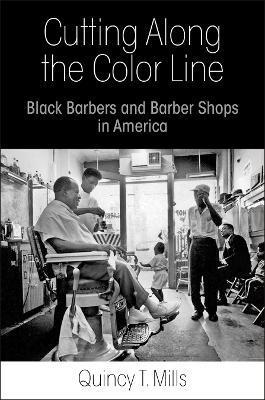Cutting Along the Color Line: Black Barbers and Barber Shops in America

Cutting Along the Color Line: Black Barbers and Barber Shops in America
Today, black-owned barber shops play a central role in African American public life. The intimacy of commercial grooming encourages both confidentiality and camaraderie, which make the barber shop an important gathering place for African American men to talk freely. But for many years preceding and even after the Civil War, black barbers endured a measure of social stigma for perpetuating inequality: though the profession offered economic mobility to black entrepreneurs, black barbers were obliged by custom to serve an exclusively white clientele. Quincy T. Mills traces the lineage from these nineteenth-century barbers to the bustling enterprises of today, demonstrating that the livelihood offered by the service economy was crucial to the development of a black commercial sphere and the barber shop as a democratic social space.
Cutting Along the Color Line chronicles the cultural history of black barber shops as businesses and civic institutions. Through several generations of barbers, Mills examines the transition from slavery to freedom in the nineteenth century, the early twentieth-century expansion of black consumerism, and the challenges of professionalization, licensing laws, and competition from white barbers. He finds that the profession played a significant though complicated role in twentieth-century racial politics: while the services of shaving and grooming were instrumental in the creation of socially acceptable black masculinity, barbering permitted the financial independence to maintain public spaces that fostered civil rights politics. This sweeping, engaging history of an iconic cultural establishment shows that black entrepreneurship was intimately linked to the struggle for equality.PRP: 232.11 Lei
Acesta este Prețul Recomandat de Producător. Prețul de vânzare al produsului este afișat mai jos.
208.90Lei
208.90Lei
232.11 LeiLivrare in 2-4 saptamani
Descrierea produsului
Today, black-owned barber shops play a central role in African American public life. The intimacy of commercial grooming encourages both confidentiality and camaraderie, which make the barber shop an important gathering place for African American men to talk freely. But for many years preceding and even after the Civil War, black barbers endured a measure of social stigma for perpetuating inequality: though the profession offered economic mobility to black entrepreneurs, black barbers were obliged by custom to serve an exclusively white clientele. Quincy T. Mills traces the lineage from these nineteenth-century barbers to the bustling enterprises of today, demonstrating that the livelihood offered by the service economy was crucial to the development of a black commercial sphere and the barber shop as a democratic social space.
Cutting Along the Color Line chronicles the cultural history of black barber shops as businesses and civic institutions. Through several generations of barbers, Mills examines the transition from slavery to freedom in the nineteenth century, the early twentieth-century expansion of black consumerism, and the challenges of professionalization, licensing laws, and competition from white barbers. He finds that the profession played a significant though complicated role in twentieth-century racial politics: while the services of shaving and grooming were instrumental in the creation of socially acceptable black masculinity, barbering permitted the financial independence to maintain public spaces that fostered civil rights politics. This sweeping, engaging history of an iconic cultural establishment shows that black entrepreneurship was intimately linked to the struggle for equality.Detaliile produsului









